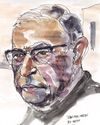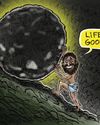Alistair MacFarlane considers the modes of life of a conservative philosopher.

Michael Oakeshott, like Ludwig Wittgenstein, is a philosopher’s philosopher. He had a unique point of view, and a coherent way of looking at life, clearly expressed in wonderfully elegant prose. Oakeshott was also utterly indifferent to fashion in academic, political and philosophical life, and pursued obscurity to a point of near public invisibility. On his death, the local pastor who was due to take his funeral service was astounded to read in his Daily Telegraph of 21st December 1990 that he was soon to bury “the greatest political philosopher in the Anglo-Saxon tradition since Mill – or even Burke.” The Guardian called him “perhaps the most original academic philosopher of this century”; and in the Independent his writing was compared to the essays of Montaigne, which would have greatly pleased him. When reporters asked his neighbours about him, all they learned was that he had rebuilt, with his own hands, the cottage where he lived, and that he drove a very old sports car. As for where he came from, or what he had done for a living, they had no idea.
Esta historia es de la edición October/November 2017 de Philosophy Now.
Comience su prueba gratuita de Magzter GOLD de 7 días para acceder a miles de historias premium seleccionadas y a más de 8500 revistas y periódicos.
Ya eres suscriptor ? Conectar
Esta historia es de la edición October/November 2017 de Philosophy Now.
Comience su prueba gratuita de Magzter GOLD de 7 días para acceder a miles de historias premium seleccionadas y a más de 8500 revistas y periódicos.
Ya eres suscriptor? Conectar

The Two Dennises
Hannah Mortimer observes a close encounter of the same kind.

Heraclitus (c.500 BC)
Harry Keith lets flow a stream of ideas about permanence and change.

Does the Cosmos Have a Purpose?
Raymond Tallis argues intently against universal intention.

Is Driving Fossil-Fuelled Cars Immoral?
Rufus Duits asks when we can justify driving our carbon contributors.

Abelard & Carneades Yes & No
Frank Breslin says 'yes and no' to presenting both sides of an argument.

Frankl & Sartre in Search of Meaning
Georgia Arkell compares logotherapy and atheistic existentialism.

Luce Irigaray
Luce Irigaray, now ninety-two years old, was, among many other things, one of the most impactful feminists of the 1970s liberation movements - before she was marginalised, then ostracised, from the francophone intellectual sphere.

Significance
Ruben David Azevedo tells us why, in a limitless universe, we’re not insignificant.

The Present Is Not All There Is To Happiness
Rob Glacier says don’t just live in the now.

Philosophers Exploring The Good Life
Jim Mepham quests with philosophers to discover what makes a life good.